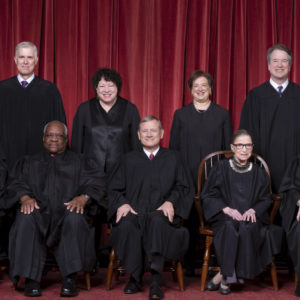In recent years, the Supreme Court has issued ruling after ruling awarding more power to large corporations. Most notably, the 2010 Citizens United ruling opened the floodgates to an unprecedented deluge of corporate cash in our elections.
Now, however, the court’s right-wing majority appears prepared to offer an even bigger boon: A virtual blanket ban on a huge swath of regulations protecting the health and safety of Americans.
Amid the hurricane-like news cycles of the 2020 presidential race, it’s an under-reported issue that could have tremendous implications regardless of who wins the next election.
The basic issue is whether Congress can delegate to federal departments and agencies the authority to write regulations. For instance, the 1970s-era Clean Air and Clean Water Acts authorize the EPA to update its regulation of polluting industries to account for practices and technologies that may not have existed back then. As a result, we have cleaner air and water today.
Countless other laws take the same approach, from the Affordable Care Act of the Obama era on back to the banking regulations passed as a result of the Great Depression.
But for years, conservative legal scholars have been urging the Supreme Court to roll back these regulations by endorsing a reading of the Constitution that would prevent such delegation. If they succeed, Justice Elena Kagan warns, the conservative majority will essentially rule that “most of [the] government is unconstitutional.”
A recent case, Gundy v. U.S., did not yet overturn those precedents. But it strongly suggests that five justices stand prepared to do so.
In that ruling, conservative justices Neil Gorsuch, John Roberts and Clarence Thomas went on record insisting that delegation violates their view of the separation of powers. Another justice, Samuel Alito, wrote a separate opinion indicating that “if a majority of this Court were willing to reconsider the approach,” he “would support that effort.”
Now, with Justice Brett Kavanaugh seated, they may have it. The fifth conservative, who wasn’t yet seated during the Gundy case, wrote last year in support of the view that would forbid Congress from allowing agencies “to exercise regulatory authority over a major policy question of great economic and political importance.”
Unless the court shifts to a more moderate majority before then, the court seems set on a course to curtail radically the capacity of the federal government to implement the will of Congress.
Based on my long experience working as an economist at both ends of Pennsylvania Avenue, I am deeply troubled by this possibility.
As a senior staffer in Congress, I worked on legislation for which the delegation of further details to the executive branch was essential to achieve Congress’ desired outcome.
Since the nation’s early days, Congress has created agencies with authority to write regulations. Through detailed rulemaking procedures, agencies gather input from a broad range of stakeholders and apply their own expert knowledge to clarify statutory ambiguities.
That provides invaluable predictability for businesses and consumers alike, while accounting for future developments in technology lawmakers can’t predict.
Congress holds these agencies accountable for their actions in various ways. Agency heads are confirmed by the Senate. Agencies are subject to continuing congressional oversight. Agencies themselves are bound by the regulations they promulgate.
This system, essentially in place since the birth of our nation, has provided an efficient, effective and fair way to achieve the laws’ purposes. Without directly enforceable interpretations by federal agencies, actually implementing federal statutes would require case-by-case litigation.
And that, explains Vox’s Ian Millhiser, “would give the Republican-controlled Supreme Court a veto power over all federal regulations. That prospect should chill each of the Democratic presidential candidates to the bone.”
Without the power to regulate health, safety, finance and other critical areas, we’ll be living in a much sicker, more dangerous and more economically unstable world.
With technological change accelerating, we will need agency expertise — not an unaccountable conservative court majority — to devise and revise regulatory details even more in the future.

